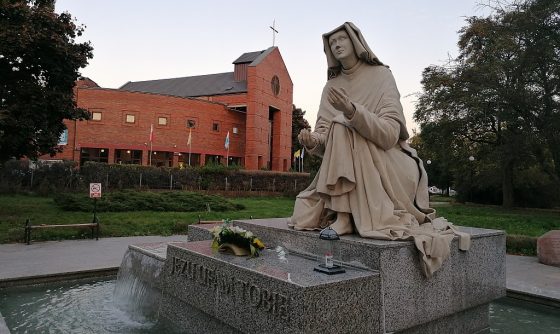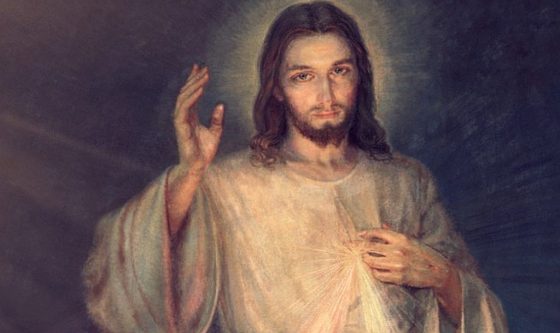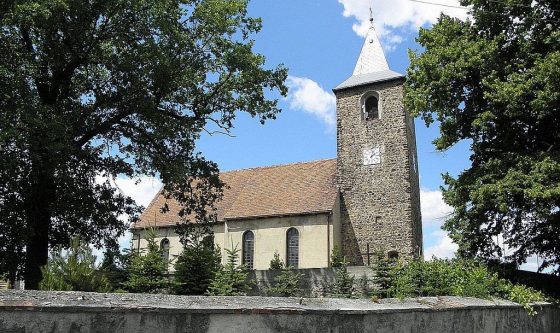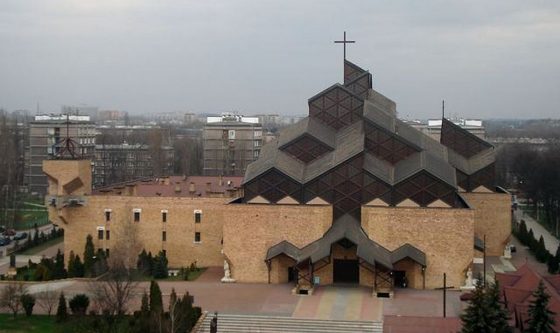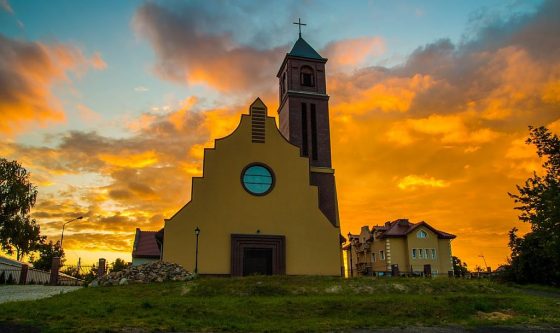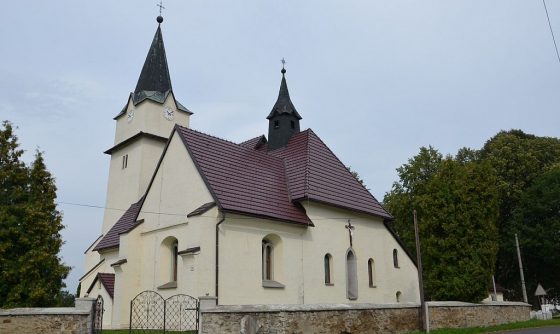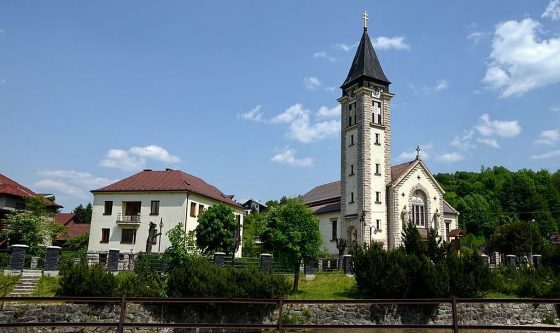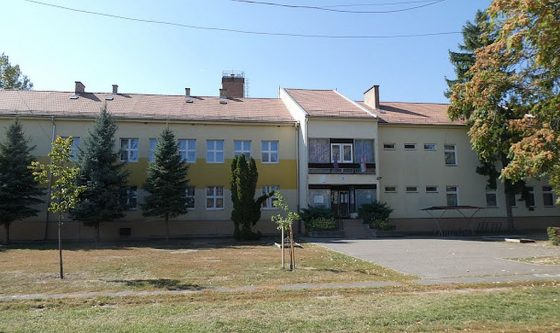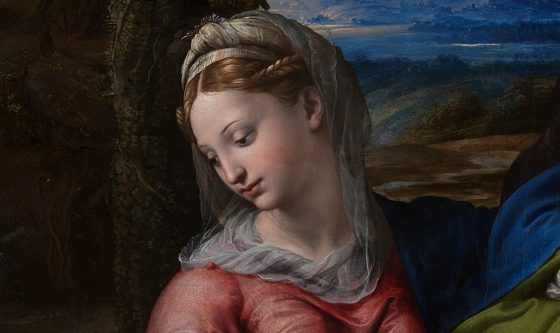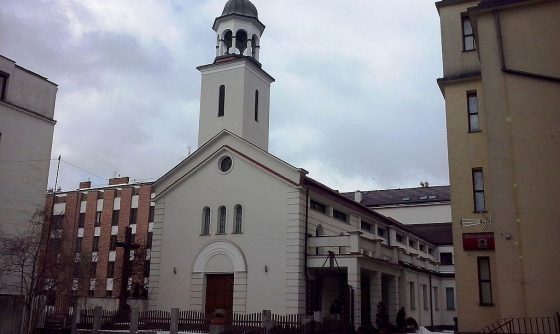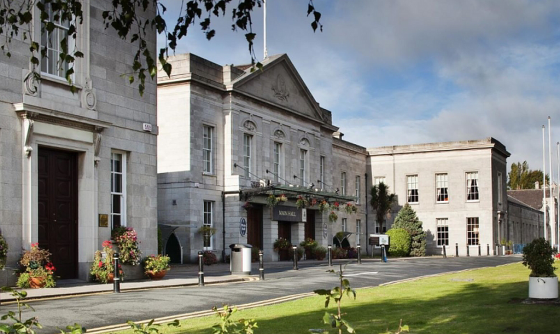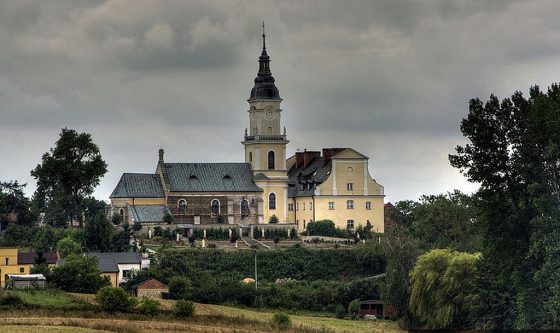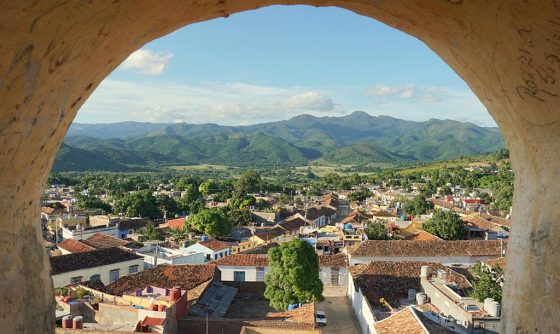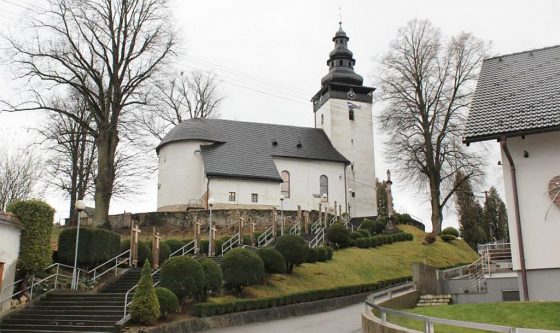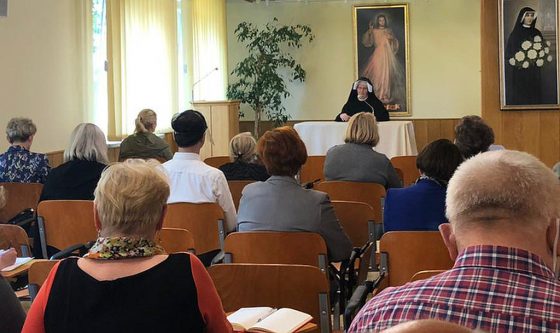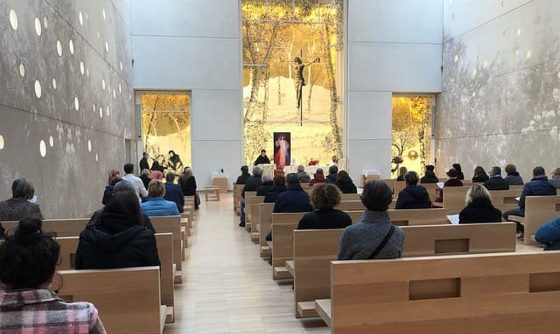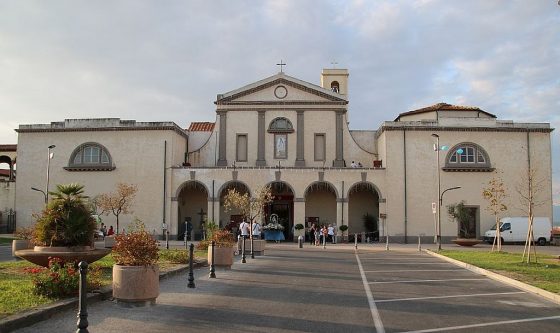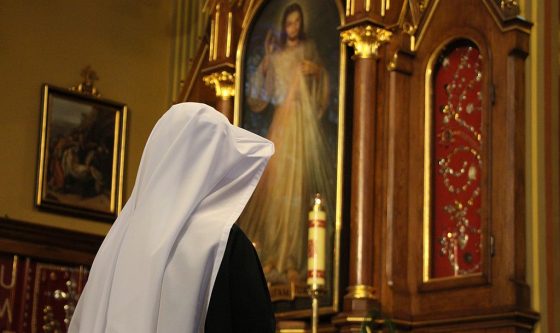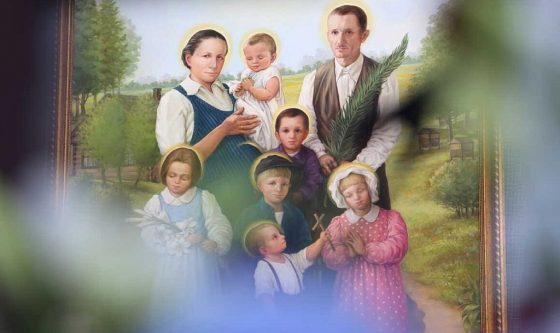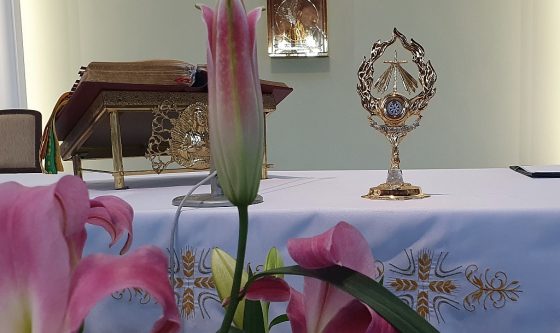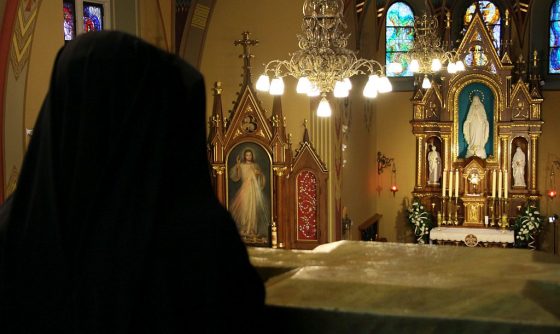Traditionally, on the eve of the Feast of Mercy, on Saturday, April 6 this year, at the Church of St. Faustina in Łódź at ul. Niepodległości, Festival of Mercy will be held in honor of St. Faustina, the patron saint of the city of Łódź. It will begin at 3 p.m. with prayer at the Hour of Mercy and the Divine Mercy Chaplet, followed by a concert and singing together with the Sacred Music Ensemble “Lumen” from Poznań.
This year’s festivities will be a preparation for the celebration of the 100th anniversary of the revelation that St. Faustina had in Łódź “Wenecja” park and in the Cathedral of St. Stanislaus Kostka, which will be celebrated on June 29 this year.
Such is the theme of the retreat to be held at the Shrine of Divine Mercy in Krakow-Łagiewniki on March 22-24. The message will be the words of St. Faustina recorded in her Diary. “O Jesus, do with me whatever you please; I know You are my merciful Savior” (Diary, 854). In an atmosphere of silence and prayer the participants of the retreat will discover the beauty of the face of Merciful Jesus through His names which the Apostle of Divine Mercy used, or which He revealed to her Himself. Your guides during the retreat will be Sr. Emanuela Gemza of the Congregation of the Sisters of Our Lady of Mercy, head of the Faustinum Association, and Fr. Krzysztof Kowal, M.S., spiritual director responsible for the La Salette postulate.
On March 22-24, a vocational retreat for girls and women will take place in the Discalced Carmelites monastery in Lorinčík near Košice in the south of Slovakia, themed “I will never leave you nor forsake you”: (Heb 13:5. It will be led by Father Andrej Valent OCD and Sr. Benediktína Fečová from the Košice community of the Congregation of the Congregation of Our Lady of Mercy.
On March 21-23, the parish of St. Anthony of Padua in Lipinki Łużyckie and the filial churches in Boruszyn and Pietrzykow (Zielona Góra-Gorzów Diocese) will hold a Lenten retreat for children, teens and adults dedicated to the Mercy of God and people. Based on the Bible and the spiritual experience of St. Faustina recorded in her Diary, it will be delivered by Sr. Leonia, Sr. Rachela and Sr. Mariam from the Płock community of the Congregation of the Sisters of Our Lady of Mercy.
On March 18-22, the parish of Our Lady of Częstochowa in Krakow’s Nowa Huta will hold a retreat for children from three elementary schools (Nos. 88, 91, 105) under the theme: “Explorers of the Buried Treasure”. They will be led by Sr. Maria Faustina and Sr. Tobiana from the Krakow community of the Congregation of Our Lady of Mercy, based on the Gospel and the spiritual legacy of St. Faustina.
On March 16-20, the parish of Divine Mercy in Żary (Zielona Góra-Gorzów Diocese) will hold Lenten retreat for children, teens and adults, dedicated to the Mercy of God and people. Based on the Bible and the spiritual experience of St. Faustina recorded in her Diary, it will be delivered by Sr. Leonia, Sr. Rachela and Sr. Mariam from the Płock community of the Congregation of the Sisters of Our Lady of Mercy.
A retreat on the dignity of women will be held from March 15-17 at the parish of Saints Apostles Peter and Paul in Chkalovo under the theme Little girl, I say to you, get up! It will be delivered by Sr. Anastasis Omelchenko of the Petropavlovsk community of the Congregation of Our Lady of Mercy, Sr. Kazimiera Wanat and Sr. Madlen Hofmann. The retreat will include meeting with the word of God, conferences, and workshops.
On March 17, a Lenten day of recollection will be held at St. Margaret of Antioch parish in Plaveč and the Kozelec filial church (northeastern Slovakia), led by Sisters from the Košice community of the Congregation of Our Lady of Mercy. The program includes conferences, Way of the Cross, praying the Hour of Mercy and the Chaplet to Divine Mercy, and veneration of the relics of St. Faustina Kowalska.
On Friday, March 15, a Lenten day of recollection will be held at the parish of Sts. Cyril and Methodius in Terchova in northern Slovakia. On the initiative of local members of the Faustinum Association, the day of recollection will be led by Sr. M. Blanka Krajčíková of the Košice community of the Congregation of the Sisters of Our Lady of Mercy. The meeting agenda includes conferences, Way of the Cross and veneration of relics of St. Faustina Kowalska.
On Tuesday, March 12, a Lenten day retreat for children from the István Széchenyiho Catholic Primary School will be held in Füzesabony, Hungary. Conferences on God’s merciful love toward us and on St. Faustina’s experience of Lent and the entire retreat will be delivered by Sr. M. Hedvig Uličná from the community of the Congregation of the Sisters of Our Lady of Mercy in Nižný Hrušov, Slovakia.
Mary, Mother of the Son of God, Mercy Incarnate and Mother of each of us. Ultimately beautiful in her love for God and man. A role model for every girl, mother and consecrated person. That is why we direct our prayers of thankfulness and supplication. To read more about the most beautiful of Women, Our Lady of Mercy, her veneration, iconography, liturgy and prayers, visit: www.saint-faustina.org.
Such is the theme of the retreat for women of the Kostanay deanery in Kazakhstan to be held on March 1-3 at the parish of the Sacred Heart of Jesus in Lisakovsk. The topic of the meeting will be woman’s dignity. It will be delivered by Sr. Anastasis Omelchenko of the Petropavlovsk community of the Congregation of Our Lady of Mercy, Sr. Madlen Hofmann and Fr. Hans Reiner. The retreat will feature Bible meditations, lectures and workshops.
From February 28 to March 1, Sister Terezjana and Sister Tobiana from the Congregation of Our Lady of Mercy will lead a Lenten retreat for children from primary school No. 221. The retreat will take place at the Sanctuary of Saint Sister Faustina in Warsaw, and their topic will be: “Faith, hope and love in the light of the message of Mercy”.
The annual National Conference on Divine Mercy will be held in Dublin on February 23-25 under the slogan: “Jesus, I trust in You.” This time it will be attended by Sister Mary Claire and Sister Donata from two communities of the Congregation of Our Lady of Mercy in the USA, who will give several speeches related to the spiritual heritage of Saint Sister Faustina. The event will be broadcast live.
Such is the motto of a retreat for apostles of Divine Mercy, which will be held on February 23-25 at the Retreat House of the Pauline Fathers at the Shrine of Our Lady of Victory in Brdów. The program includes daily Eucharist, adoration of the Holy Sacrament, and conferences giving the opportunity to learn more about the mercy of God the Father. The retreat is held in an atmosphere of silence and recollection, without access to the media and cell phones, in order to hear in silence the stirrings of God’s Spirit (cf. Diary, 145). It will be delivered by Sr. Maria Faustyna Ciborowska and Sr. Emanuela Gemza from the community of the Congregation of Our Lady of Mercy at the Shrine of Divine Mercy in Krakow-Łagiewniki.
On February 24-25, Sister Caterina Esselen from the Washington community of the Congregation of Our Lady of Mercy will take part in the annual Conference on the Divine Mercy in Trinidad, which is organized under the slogan: “This is my beloved Son, listen to Him.” Sister Caterina will share the spiritual heritage of Saint Sister Faustina recorded in her “Diary”
During spring break from February 18-20 in the parish of St. Nicholas in Domaniži, Slovakia, there will be a retreat for girls of the second grade of primary school. The retreat on Saint Sister Faustina as an apostle of Divine Mercy will be led by Sister Blanka Krajčíková and Sister Alžbeta Mikušová from the Košice community of the Congregation of Our Lady of Mercy. The program includes conferences, workshops, adoration, a film about Saint Faustina, a common rosary and testimonies.
Febuary 17 this year (third Saturday of the month) at the Sanctuary of Divine Mercy in Krakow-Łagiewniki there will be a monthly meeting of the Krakow community of the Association of Apostles of Divine Mercy “Faustinum”. The program includes, among others: prayer at the Hour of Mercy and the Chaplet of Divine Mercy, Eucharist and adoration of the Blessed Sacrament with prayer of adoration, as well as a conference and agape.
The “Faustinum” Association, established in 1996 by the Metropolitan of Krakow, Cardinal Franciszek Macharski, as an apostolic work of the Congregation of the Sisters of Our Lady of Mercy, brings together priests, consecrated persons and lay people from almost 90 countries around the world, who, following the example of St. Sisters Faustina want to participate in Jesus’ mission of proclaiming the Message of Mercy to the world through their testimony of life, deed, word and prayer. The main task of “Faustinum” is the formation of apostles of Divine Mercy, which the sisters conduct in several languages. More information at: www.faustinum.pl
February 17 this year in Bergamo (Italy) there will be a day of retreat for the apostles of Divine Mercy from the “Faustinum” association from all over Lombardy under the slogan: “The time of Lent is a time of conversion.” It will be led by: Father Attilio Gueli OFMCap and Father Luca Mantovani OFMCap and Sister Wincenta Mąka from the Roman community of the Congregation of Our Lady of Mercy. The sister will give a conference on the topic: “Trust and encounter with the merciful God in the sacrament of reconciliation in the process of conversion based on the Diary of St. Faustyna.” In addition to the conference, the program includes: Holy Mass, Eucharistic adoration, prayer at the Hour of Mercy and the Chaplet, as well as fraternal agape and sharing reflections of the day.
Seit vielen Jahren ist der erste Freitag der Fastenzeit (dieses Jahr der 16. Februar) in Polen ein Tag des Gebets und der Buße für die Sünde des sexuellen Missbrauchs von Minderjährigen. Wir vertrauen der Barmherzigkeit Gottes alle Personen an, die in ihrer Kindheit oder Jugend durch sexuelle Gewalt verletzt wurden, vor allem wenn die Täter Geistliche waren. Wir bitten auch für die Gnade der Bekehrung für die Täter dieser schrecklichen Verbrechen und diejenigen, die als Zeugen des Bösen nicht für die Verletzten eintraten – mögen Sie sich auf dem Weg der Erkennung der Wahrheit und der Annahme der gerechte Strafe für ihre Taten aufrichtig mit Gott und der Kirchengemeinschaft versöhnen. Im Sanktuarium der Barmherzigkeit Gottes in Krakau-Łagiewniki beten wir besonders in diesem Anliegen im Gebet zur Stunde der Barmherzigkeit und im Barmherzigkeitsrosenkranz.
On February 7 this year, at the convent of the Congregation of the Sisters of Our Lady of Mercy in Whasington, the silver anniversary of the religious profession of Sister Teresa de la Fuente will be celebrated. In the National Shrine of Saint John Paul II in Washington, a solemn Holy Mass will be celebrated with the renewal of the vows of chastity, poverty and obedience by the Jubilarian, whose outer sign is a silver ring with the engraved name of Jesus. Sisters in the remaining convents of the Congregation, as well as the Family and persons entrusted with apostolic work will join in the prayer of thanksgiving for the gift of the Jubilarian and in her intentions.
On February 3 and 4, Sr. Tymoteusz Kmiotek and Sr. Wincenta Mąka from the Roman community of the Congregation of the Sisters of Our Lady of Mercy will take part in the ceremonial introduction of the relics of St. Sister Faustina in the parish of Our Lady in San Romano, near Pisa in Tuscany. On this occasion, they will share the spiritual heritage of the Apostle of Divine Mercy recorded in her “Diary” and their own testimony of her intercession and participation in her mission of proclaiming the Message of Mercy to the world.
On 2 February, at 10:30 am at the Shrine of Divine Mercy, 2 sisters from the Congregation of Our Lady of Mercy, after serving a two-year novitiate and making an eight-day retreat, will make their first vows before the Superior General, Mother Miriam Janiec. The ceremonies, taking place in the convent chapel of the miracle-famous image of Merciful Jesus and the tomb of St. Faustina will be presided Fr. Robert Więcek SJ. The ceremony will be attended by sisters from many convents of the Congregation and families of the sisters. During the first profession, sisters make vows of chastity, poverty and obedience to Jesus for a year, which are then renewed for five consecutive years. After this period, perpetual vows take place.
On Sunday, 28 January, a solemn introduction of relics of the blessed Ulma Family will be introduced in the Basilica at the Shrine of Divine Mercy in Krakow-Łagiewniki. Sermons at all services will be delivered by Fr. Dr Witold Burda, postulant in the beatification process of these Good Samaritans of Markowa.
The Congregation of the Sisters of Our Lady of Mercy in Krakow-Łagiewniki would like to thank you for all the donations so far for the camera to be broadcasting from the chapel of the miracle-famous Divine Mercy Image and the tomb of St. Faustina. We are now able to purchase a revolving Panasonic aw-ue-160 camera that ensures TV-like quality and a continuing broadcasting at Faustyna.pl and all its language versions (10 pages in total) and our YouTube channel: Faustyna.pl website, the Faustyna.pl YouTube channel and the mobile application with the same name. The Sony camera we are currently using has been broadcasting the round-the-clock video stream 24 since 2015 and will remain as a backup camera. The video stream is used by the faithful from all over the world who wish to make a virtual pilgrimage to the holy place to plead for mercy “for us and the whole world”.
We are praying for all our benefactors and donors every day, especially at the Hour of Mercy (3 pm) and the Chaplet of Divine Mercy in addition to their prayerful intentions.
In 2023, the Sisters of Our Lady of Mercy, who are the sole custodian of the relics of St. Faustina, sent 135 particles of these relics (130 ex ossibus relics – bone – and 5 from her religious habit) to 26 countries around the world, for the first time to the Republic of Malawi in East Africa. In Europe, the Apostle of Divine Mercy in the sign of her relics went to 6 countries. In addition, to: China, the Philippines, Indonesia, South Korea, Lebanon, USA, Puerto Rico, El Salvador, Argentina, Bolivia, Brazil, Mexico, Australia, Guinea-Bissau, Cameroon, South Africa, Tanzania, Uganda and Zambia.
Saint Faustina in the sign of her relic is now present in 129 countries of the world on all continents, in 5,833 churches, shrines and chapels, where Divine Mercy is revered in a special way.
Due to the eight day retreat that will take place on January 16-24, there will be no news or gallery updates at www.saint-faustina.org. All the remaining works and will continue as will praying for all our coworkers and visitors of our Faustyna.pl website and our Faustyna.pl application.











